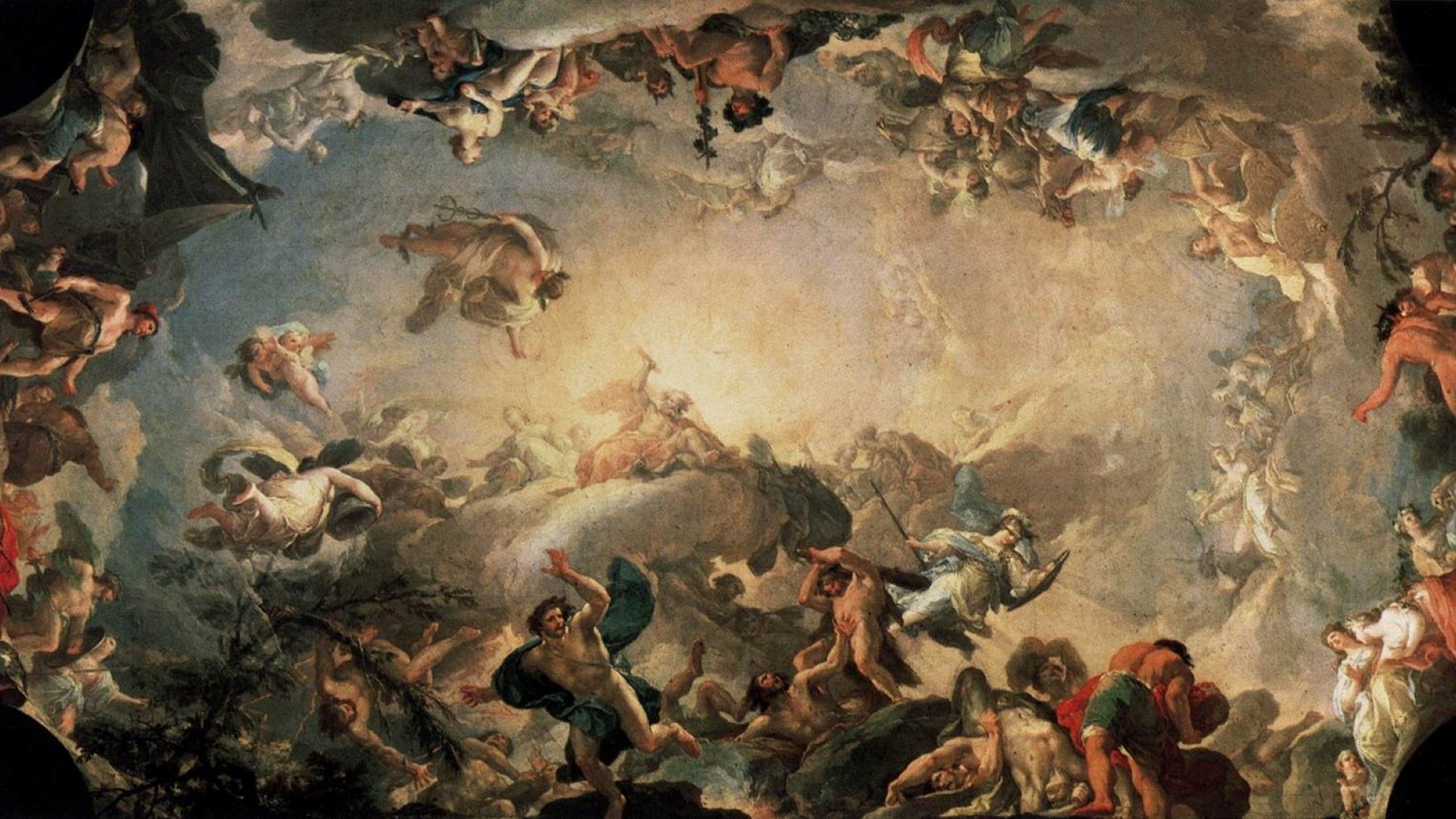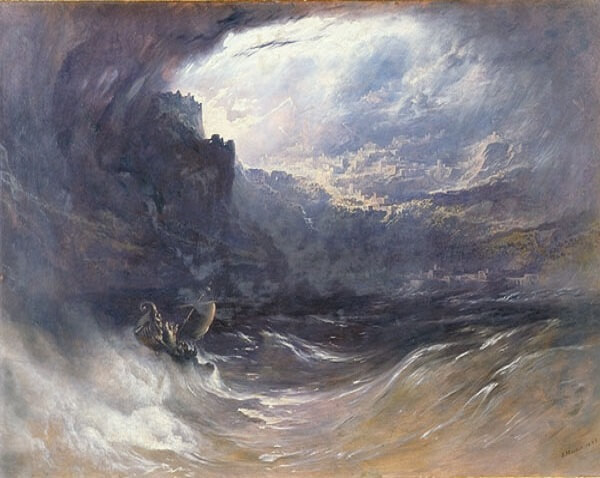
The Three Great Floods

According to Ancient Greek Mythology, there have been three main floods that practically shook up the world; namely, Ogyges, Deucalion (researchers relate this one with the Epic of Gilgamesh and the story of Noah's Ark) and Dardanus.
Ogyges
The Ogygian flood is so called because it occurred in the time of Ogyges, a mythical king of Attica. The name "Ogyges" and "Ogygian" is synonymous with "primeval", "primal" and "earliest dawn".
Others say he was the founder and king of Thebes.
In many traditions the Ogygian flood is said to have covered the whole world and was so devastating that Attica remained without kings until the reign of Cecrops.
Plato in his Laws, Book III, argues that this flood had occurred ten thousand years before his time, as opposed to only "one or two thousand years that have elapsed" since the discovery of music, and other inventions.
Also in Timaeus (22) and in Critias (111-112) he describes the "great deluge of all" as having been preceded by 9,000 years of history before the time of his contemporary Solon, during the 10th millennium BCE.
In addition, the texts report that "many great deluges have taken place during the nine thousand years" since Athens and Atlantis were preeminent.
Deucalion
Lycaon and the Wickedness of Mortals
In the Age of Iron, Zeus took the form of a man to find out whether reports of the great wickedness of mortals were true.
He visited the home of LYCAON [leye-kay'on] or LYKAON and announced that a god was present, but Lycaon, an evil tyrant, only scoffed and planned to kill Zeus during the night to prove that the visitor was not a god.
Lycaon even went so far as to slaughter a man and offer human flesh as a meal for Zeus, who in anger brought the house down in flames.
Lycaon fled but was turned into a howling, bloodthirsty wolf, a kind of werewolf in fact, since in this transformation he still manifested his human, evil looks and nature.
Disgusted with the wickedness that he found everywhere he roamed, Zeus decided that the human race must be destroyed by a great flood.
The Titan Prometheus advised his son Deucalion to build a chest. All other men perished except for a few who escaped to high mountains.
The mountains in Thessaly were parted, and all the world beyond the Isthmus and Peloponnese was overwhelmed. Deucalion and his wife Pyrrha, after floating in the chest for nine days and nights, landed on Parnassus.
An older version of the story told by Hellanicus has Deucalion's "ark" landing on Mount Othrys in Thessaly.
Another account has him landing on a peak, probably Phouka, in Argolis, later called Nemea. When the rains ceased, he sacrificed to Zeus.
Then, at the bidding of Zeus, he threw stones behind him, and they became men, and the stones Pyrrha threw became women.
The Bibliotheca gives this as an etymology for Greek Laos "people" as derived from laas "stone". The Megarians told that Megarus, son of Zeus and a Sithnid nymph, escaped Deucalion's flood by swimming to the top of Mount Gerania, guided by the cries of cranes.
Hellen and the Hellenes
Deucalion and Pyrrha had a son named HELLEN [hel'len]. The ancient Greeks called themselves HELLENES [hel'leenz] and their country HELLAS [hel'las], and so Hellen was their eponymous ancestor.
From The Theogony of Hesiod
According to the Theogony, Prometheus moulded men out of water and earth and gave them fire which, unknown to Zeus, he had hidden in a stalk of fennel.
When Zeus learned of it, he ordered Hephaestus to nail Prometheus to Mount Caucasus, a Scythian mountain. Prometheus was nailed to the mountain and kept bound for many years. Every day an eagle swooped on him and devoured the lobes of his liver, which grew by night. That was the penalty that Prometheus paid for the theft of fire until Hercules afterwards released him.
Prometheus had a son Deucalion. He, reigning in the regions about Phthia, married Pyrrha, the daughter of Epimetheus and Pandora, the first woman fashioned by the gods.
And when Zeus would destroy the men of the Bronze Age, Deucalion by the advice of Prometheus constructed a chest, and having stored it with provisions he embarked in it with Pyrrha.
But Zeus by pouring heavy rain from heaven flooded the greater part of Greece, so that all men were destroyed, except a few who fled to the high mountains in the neighbourhood and Peloponnesus was overwhelmed.
But Deucalion, floating in the chest over the sea for nine days and as many nights, drifted to Parnassus, and there, when the rain ceased, he landed and sacrificed to Zeus, the god of Escape.
And Zeus sent Hermes to him and allowed him to choose what he would, and he chose to get men.
At the bidding of Zeus he took up stones and threw them over his head, and the stones Deucalion threw became men, and the stones Pyrrha threw became women.
Hence people were called metaphorically people (Laos) from laas, "a stone". And Deucalion had children by Pyrrha, first Hellen, whose father some say was Zeus, and second Amphictyon, who reigned over Attica after Cranaus, and third a daughter Protogonia, who became the mother of Aethlius by Zeus.
Hellen had Dorus, Xuthus, and Aeolus by a nymph Orseis. Those who were called Greeks he named Hellenes after himself, and divided the country among his sons.
Xuthus received Peloponnese and begat Achaeus and Ion by Creusa, daughter of Erechtheus, and from Achaeus and Ion the Achaeans and lonians derive their names. Dorus received the country over against Peloponnese and called the settlers Dorians after himself.
Aeolus reigned over the regions about Thessaly and named the inhabitants Aeolians. He married Enarete, daughter of Deimachus, and begat seven sons, Cretheus, Sisyphus, Athamas, Salmoneus, Deion, Magnes, Perieres, and five daughters, Canace, Alcyone, Pisidice, Calyce, Perimede.
Perimede had Hippodamas and Orestes by Achelous; and Pisidice had Antiphus and Actor by Myrmidon. Alcyone was married by Ceyx, son of Lucifer.
These perished by reason of their pride, for he said that his wife was Hera, and she said that her husband was Zeus. But Zeus turned them into birds; her he made a kingfisher (alcyon) and him a gannet (ceyx).
Dardanus
This one has the same basic story line. According to Dionysius of Halicarnassus, Dardanus left Pheneus in Arcadia to colonize a land in the North-East Aegean Sea.
When the Dardanus' deluge occurred, the land was flooded and the mountain where he and his family survived formed the island of Samothrace.
He left Samothrace on an inflated skin to the opposite shores of Asia Minor and settled on Mount Ida. Due to the fear of another flood, they refrained from building a city and lived in the open for fifty years.
His grandson Tros eventually moved from the highlands down to a large plain, on a hill that had many rivers flowing down from Ida above.
There he built a city, which was named Troy after him. Today, we call the area "the Dardanelles" (formerly known as Hellespont), a narrow strait in northwestern Turkey that connects the Aegean Sea to the Sea of Marmara. The name is derived from Dardania, an ancient land on the Asian shore of the strait which in turn takes its name from Dardanus, the mythical son of Zeus and Electra.
Our Mobile Application
Check out Our Mobile Application "Ancient Greece Reloaded"
